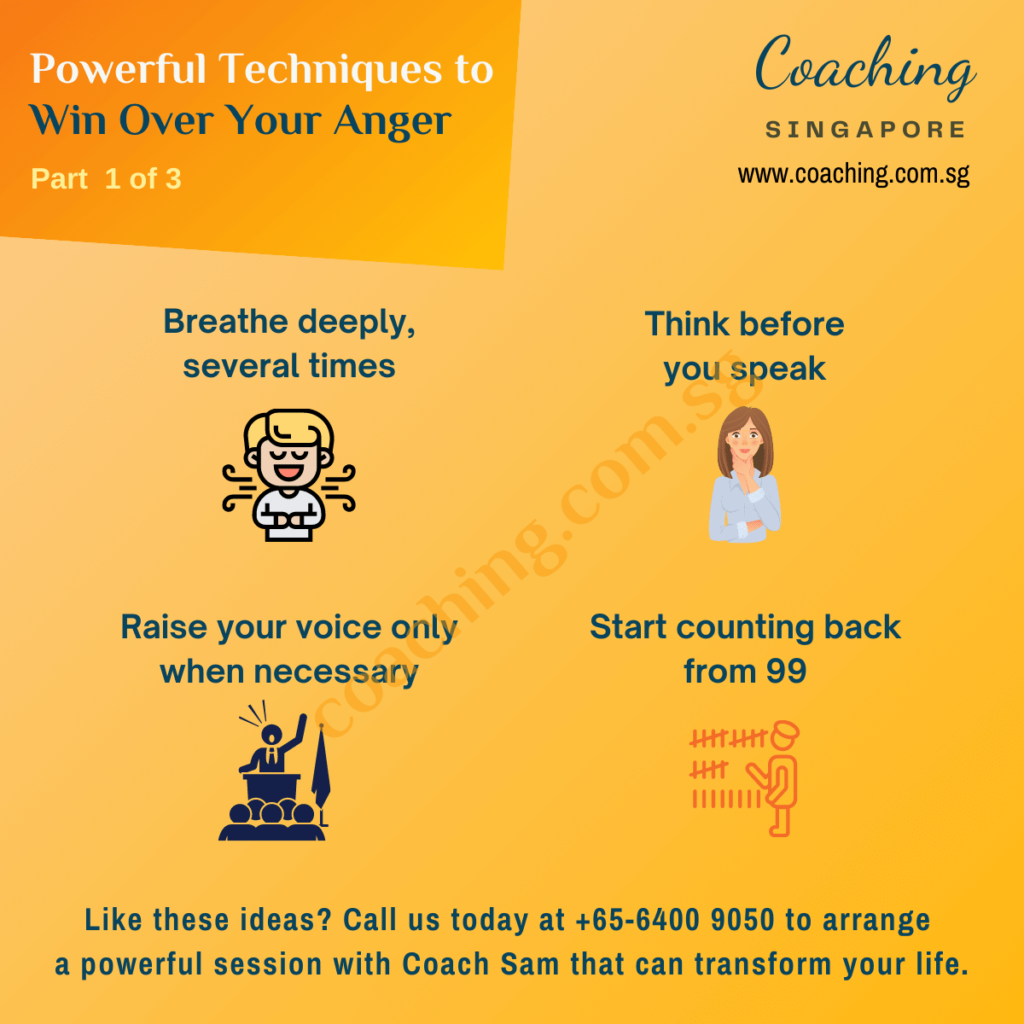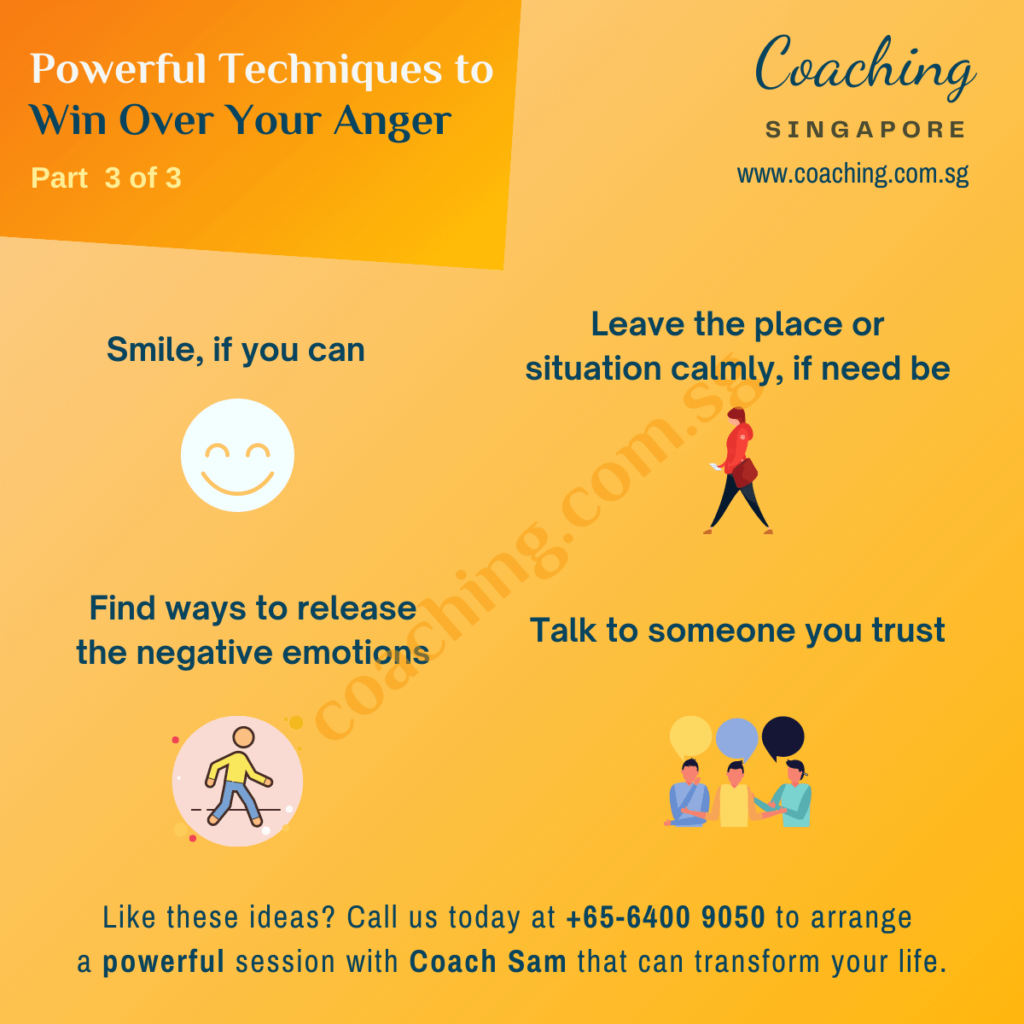Home » Interpersonal Resilience » 14 powerful techniques to win over anger: How to stay calm in situations that infuriate you
14 powerful techniques to win over anger: How to stay calm in situations that infuriate you

- Author: Coach Sam
Most of us have found ourselves in situations that make us angry and frustrated.
These may happen several times a week – at work, home, office, or on the road.
Many reasons can cause us to feel this way…
- It could be because you were promised a raise, a promotion, or an important project that was canceled at the last minute.
- Worse still, if we thought we deserved it and were passed over in favor of someone else.
- A discussion with your “friend” in the office to solve a problem led to your idea being stolen and used by him/her.
- Coerced to do something which felt wrong or incorrect, and then blamed for it.
High levels of discord and strife among staff over time reduce the productivity of the organization, thereby reducing its competitive advantage.
https://www.emerald.com/insight/content/doi/10.1108/S0742-7301(2009)0000028007/full/html
For the individual, it causes serious health problems, including chronic anxiety, depression, high blood pressure, and heart disease.
Hence, learning to deal with your anger constructively will improve your well-being and make you a more desirable person to be around and as well as a promotable employee.
Listed below are a few action points that can help you win over your anger:
1. Breathe deeply
Your breathing rate and heart rate both increase when you become emotionally stimulated.
You can learn to reverse these occurrences by deliberately slowing your breathing and/or systematically relaxing your tense muscles.
Count to 4 seconds in your mind with every in-breath, and the same time for each out-breath.
Do this several times.
Unless you are very agitated, you may pause for a second or two between each breath.
Relaxing in this manner will help you to maintain control.
2. Raise your voice only when necessary
A wise quotation from American president Theodore Roosevelt goes: “Speak softly, and carry a big stick”.
When we raise our voices as a reaction, we simply show the world that we can lose control over ourselves.
When speaking loudly, make sure it is needed to de-escalate the situation or get everyone to become quiet.
A shouting match rarely helps anyone – unless it is to make a specific point, such as not being seen as a pushover.
3. Think before you speak
Whatever you do, think about what you will say, before you say anything.
This is especially true when it comes to texting, emailing, and worst of all, public posts on social media.
Unwise or thoughtless words, once said, can never be taken back.
This can mean permanently damaged relationships or private information becoming public.
4. Watch out for needless escalation
Escalation means blowing a situation out of proportion. It is “making a mountain out of a molehill”.
Knee-jerk reactions are often more costly than helpful.
It may feel very satisfying to “take home no prisoners” and “give it back as good as you got it” in the very moment of disturbance.
Indeed, there are a few situations where such behavior is advantageous and sends a message about you to people – that you are to be treated with caution, not “messed around with”.
But in most other cases, you may want to take a step back and put things in perspective.
Make sure you actually understand what you’re angry about, paraphrase or clarify what the other person has said to you.
Is it possible to put yourself in the other person’s shoes, and give some benefit of the doubt?
This will give you time to respond like a chess player, causing the least amount of “unforced errors”.
As Bruce Lee says – “Be like water, my friend”.
Just as the splash and ripples in water will always only be proportional to the size and speed of the pebble dropped in it.

5. Start counting back from 99
“When angry, count to 99 before you speak. If very angry, a hundred,” said Thomas Jefferson, American Founding Father.
That’s still good advice, says Dan Johnston, Ph.D., an assistant professor of psychiatry and behavioral science at Mercer University School of Medicine in Macon, Ga. The familiar childhood admonition of ‘counting to 99’ before taking action works because it emphasizes the two key elements of anger management – time and distraction.
Counting to ninety-nine becomes an even more effective way of disarming anger if we also take a slow deep breath between each number.
Do the math quickly to weigh your options – how does this situation affect my life in a year, or ten, if I just let this go now.
6. Get yourself a glass of cool water
If we are hungry, thirsty, or just too hot under the collar, we are simply not comfortable.
This can be both the trigger and the fuel for being upset.
We need to reset ourselves to regain our perspective.
Taking a moment to go off and sip something, ideally looking at a different view, can lower our urge to react instantly.
7. Think of something pleasant
Remove yourself mentally out of the situation for a bit.
Imagine a nice place, inspiring person, or happy experience.
Optimists look for the good in every problem or difficulty.
When things go wrong, as they often do, the optimists say, “That’s good!”.
They then go about finding something positive about the situation.
What we know is that, if you are looking for something good or beneficial in a person or situation, you will always find it.
And while you are looking, you will be a more positive and cheerful person and it will reduce your anger levels.
That is why, it pays to train your mind to think about a nice place, inspiring person, or happy experience that empowers you and lightens up your emotions.
8. Smile at the silliness of it all
The human saga is one filled with foolish mistakes.
This includes ignoring many of the blessings while going crazy over insignificant minutia.
When we take a step back and become an observer, we find ourselves and others go from one such attachment to another – needlessly magnifying what should be let go.
An example of this is road rage when someone cuts into our lane just ahead of us.
By chasing after this person to give him/her a scowl, we only endanger ourselves, and our own driving record.
Another example is when someone is making a big fuss out of temporary (and recoverable) paper losses in the stock market.
Our human lack of wisdom in action when it matters, even among the educated elite, is simply laughable.
To live longer, we need to retain our sense of humor about just about everything that can and does happen as part of living.

9. Leave the place or situation calmly
Trying to win an argument or sticking it out in an unhealthy situation will only fuel your anger.
One of the best things you can do when your anger is rising is to remove yourself from the situation if you can.
- When a conversation gets heated, take a break.
- Leave a meeting if you think you’re going to explode.
- Go for a walk if your kids upset you.
A time-out can be key to helping you calm your mind and your body.
10. Find ways to release the negative emotions
Engage in physical activity.
Like after leaving a stressful situation, go for a walk or workout.
The endorphins that arise from exercise can help you calm down, and moving your body provides a physical outlet for your rage.
The release of negative emotions can help you reset to a calmer state.
However, maintaining a regular exercise schedule can also help you regulate your emotions in general.
11. Take a shower or bath
Spending some time in water cleanses us in more ways than one.
A variation of this idea could be a dip in the bathtub or a quick swim.
Pleasant sensations on our bodies, our skin, calm our nerves and alleviate the stress chemicals caused by (and causing) anger that was coursing through our bodies.
12. Talk to someone you trust
This needs to be someone who can give you perspective about the matter.
If there’s someone who has a calming effect on you, talking through an issue or expressing your feelings to that person may be helpful.
It’s important to note, however, that venting can backfire.
Complaining about your boss, describing all the reasons you don’t like someone, or grumbling about all of your perceived injustices may add fuel to the fire.
A common misconception is that you must have to vent your anger to feel better.
Studies show you don’t always need to “get your anger out”.
Source: https://www.pjstar.com/article/20140402/NEWS/304029908
Smashing things when you’re upset, for example, may actually make you angrier.
Thus, it’s important to use this coping skill with caution.
Likewise, if you’re going to talk to a friend, make sure you’re working on developing a solution or reducing your anger, not just venting.
It’s unfair to use them as your go-to sounding board.
Instead, you might find that the best way to use this strategy is to talk about something other than the situation causing you to feel angry.

13. Remember: everything is temporary
The Buddha spoke about “aniccha”: the law of impermanence.
Just about everything in life is touched by this law.
When days are good, receive them fully and enjoy every moment.
And when things are not so pleasant, take heart in the fact that they will not last forever.
There is always a chance for better days ahead.
Your happiness is largely impacted by your ability to let the little things go, and to realize what you can and can’t control.
So don’t sweat the small stuff.
Pick your ‘battles’ wisely and allow a tremendous sense of gratitude about all the good things you do have to overcome your mild frustrations.
14. A case for ire
There is energy in fury.
This energy can be tapped into and channeled.
A definition of passion is that it is a combination of love and anger.
So if we can practice leveraging our unpleasant emotions as a catalyst to do remarkable things – giving us both energy and courage, then we can have the best of both worlds!
A Quote:
“Music hath charms to soothe a savage beast” – British poet William Congreve.
So start listening to some tunes that can change your mood instantly.
Comment: Is there any personal technique that you use to manage your anger that was not covered in this blog?
Then do let me know in the comment section below, I would love to learn from you & hear your stories.
Share This Post, Choose Your Platform!
